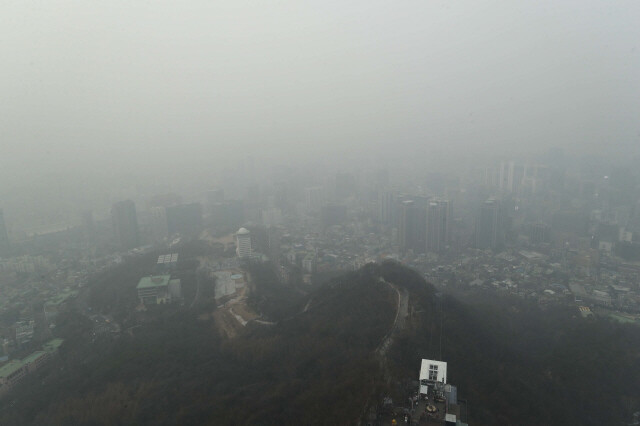hankyoreh
Links to other country sites 다른 나라 사이트 링크
Annual economic loss due to pollution over US$3.5 billion

Economic losses associated with fine particle dust amounted to 4 trillion won (US$3.53 billion) last year, while South Koreans reported being willing to spend an average of 4,500 won (US$3.98) a month in social costs to reduce the dust, study results show.
On Mar. 17, the Hyundai Research Institute (HRI) published findings from a survey of public perceptions of fine particle dust based on questionnaires administered to over 1,000 adults nationwide. According to the results, an estimated 158.6 billion won (US$140.11 million) in losses were incurred for each day that a fine dust warning was issued; with fine and ultrafine dust warnings issued for an average of 25.4 days nationwide, the estimated annual economic costs totaled around 4.023 billion, or 0.2% of the 2018 GDP of 178.2 trillion won (US$157.42 billion).
Daily costs from fine particle dust were obtained by converting the extent of perceived constraints on productive activities by industry as a result of fine dust (an average of 6.7% for all industries) into a monetary value according to nominal GDP by industry and assigning weight averages for the percentage of all workers in each industry. Weighted GDP values for South Korea’s 16 metropolitan cities and provinces were used to calculate the number of days for which fine dust warnings were issued.
A total of 71.3% respondents reported that productive activity at their respective workplace had been “constrained” as a result of fine dust, while 28.7% reported “no constraints.” In terms of the extent of constraints, 15.7% reported levels of 5–10%, 10.7% levels of 10–30%, and 10.6% levels of 3–5%. Constraint levels were higher among those working outdoors (13.6%) and those employed in farming, forestry, and fishing (8.4%).
Respondents were found to have paid a monthly average of 21,255 won (US$18.73) per household in response to fine particle dust over the past year. The most commonly reported average level of monthly expenditures was between 5,000 and 10,000 won (US$4.41-8.81, 5.7%), while 19.3% reported paying less than 5,000 won and 9.9% reported paying nothing.
When asked if they would be willing to pay associated costs for government efforts to halve the number of days for which fine dust warning are issued, more than half of respondents – 55% – said they would. The average amount respondents said they would be willing to pay was 4,532 won a month per household. When limited to households indicating a willingness to pay, the monthly average totaled 8,240 won (US$7.26). Among those who said they would not be willing to pay, reasons included “disbelief that fine dust can be presented even if taxpayer money is spent” (47.7%) and an insistence on “preventing fine dust with the money that taxpayers have already paid” (40%).
Administered to 1,008 adult men and women nationwide on Feb. 18–28, the questionnaire had a 95% confidence level and a maximum margin of error of ±3.09%p.
By Cho Kye-wan, staff reporter
Please direct comments or questions to [english@hani.co.kr]

Editorial・opinion
![[Column] Park Geun-hye déjà vu in Yoon Suk-yeol [Column] Park Geun-hye déjà vu in Yoon Suk-yeol](https://flexible.img.hani.co.kr/flexible/normal/500/300/imgdb/original/2024/0424/651713945113788.jpg) [Column] Park Geun-hye déjà vu in Yoon Suk-yeol
[Column] Park Geun-hye déjà vu in Yoon Suk-yeol![[Editorial] New weight of N. Korea’s nuclear threats makes dialogue all the more urgent [Editorial] New weight of N. Korea’s nuclear threats makes dialogue all the more urgent](https://flexible.img.hani.co.kr/flexible/normal/500/300/imgdb/original/2024/0424/7317139454662664.jpg) [Editorial] New weight of N. Korea’s nuclear threats makes dialogue all the more urgent
[Editorial] New weight of N. Korea’s nuclear threats makes dialogue all the more urgent- [Guest essay] The real reason Korea’s new right wants to dub Rhee a founding father
- [Column] ‘Choson’: Is it time we start referring to N. Korea in its own terms?
- [Editorial] Japan’s rewriting of history with Korea has gone too far
- [Column] The president’s questionable capacity for dialogue
- [Column] Are chaebol firms just pizza pies for families to divvy up as they please?
- [Column] Has Korea, too, crossed the Rubicon on China?
- [Correspondent’s column] In Japan’s alliance with US, echoes of its past alliances with UK
- [Editorial] Does Yoon think the Korean public is wrong?
Most viewed articles
- 1[Column] Park Geun-hye déjà vu in Yoon Suk-yeol
- 2Will NewJeans end up collateral damage in internal feud at K-pop juggernaut Hybe?
- 3The dream K-drama boyfriend stealing hearts and screens in Japan
- 4Thursday to mark start of resignations by senior doctors amid standoff with government
- 5Why Korea shouldn’t welcome Japan’s newly beefed up defense cooperation with US
- 6[Guest essay] The real reason Korea’s new right wants to dub Rhee a founding father
- 7N. Korean hackers breached 10 defense contractors in South for months, police say
- 8[Editorial] New weight of N. Korea’s nuclear threats makes dialogue all the more urgent
- 9Up-and-coming Indonesian group StarBe spills what it learned during K-pop training in Seoul
- 10Terry Anderson, AP reporter who informed world of massacre in Gwangju, dies at 76